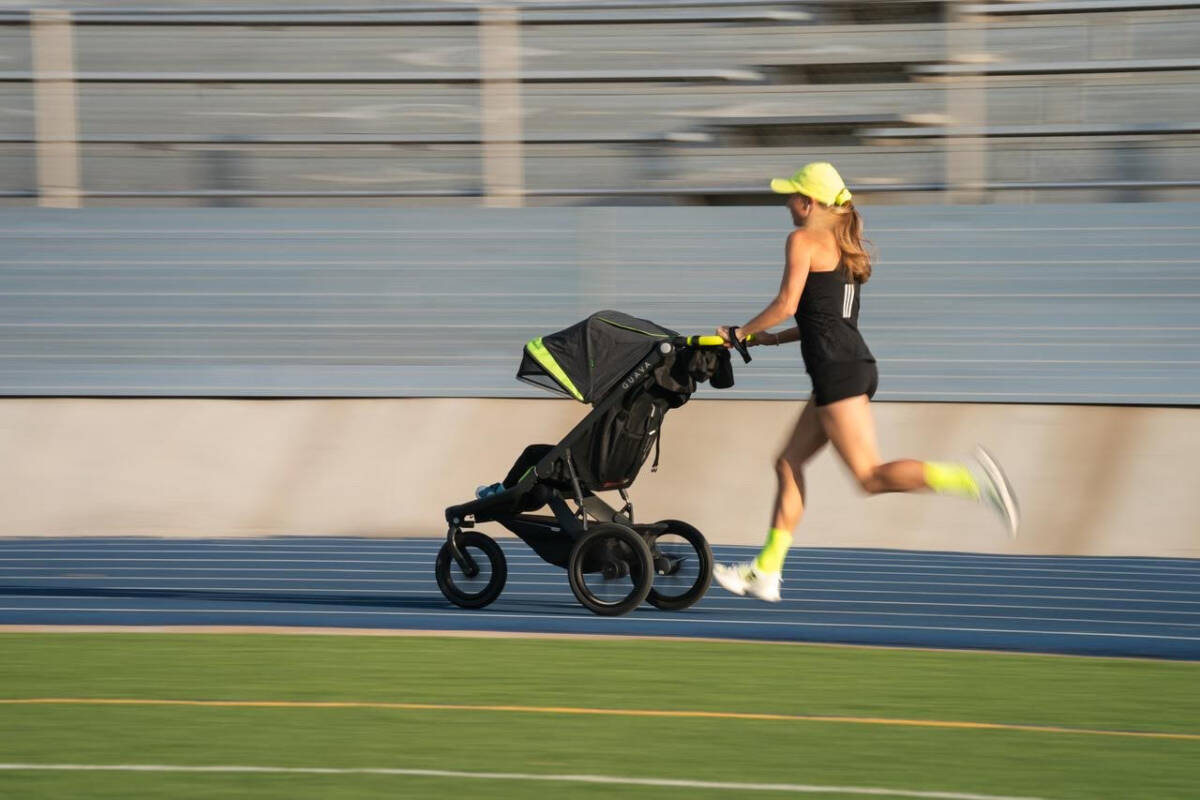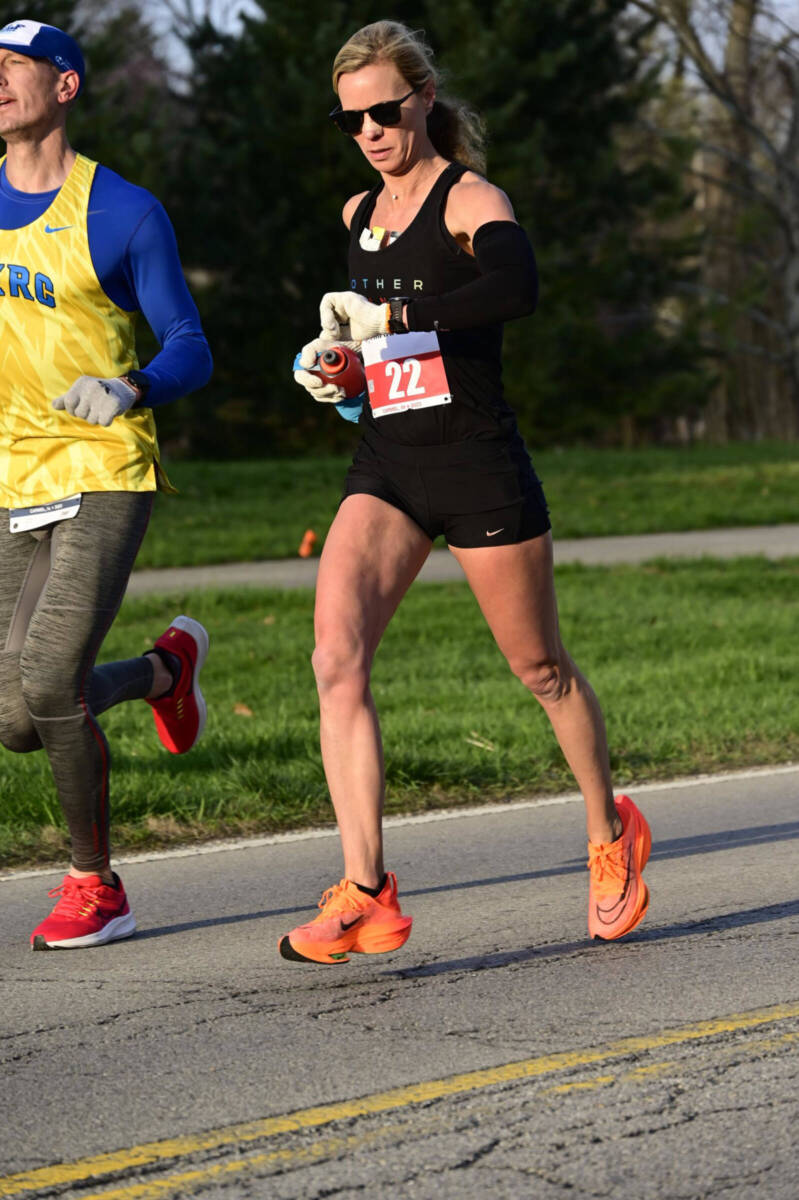Your Pregnant Running Nutrition Guide
Fueling well is crucial for any runner’s performance. As a pregnant runner, nutrition is even more vital. Your body is doing two remarkable and stressful things at once–running and growing a human. Here I’m going to cover all you need to know about pregnant running nutrition.

Any pregnant runner knows that eating well can be difficult thanks to issues like nausea, acid reflux, and constipation. Nothing can put a damper on being able to run while pregnant than not being able to eat. But I got you. Thanks to the advice from registered dietitian Amy Stephens, who works with elite runners, I have information to help you hydrate and fuel your pregnant running well.
Before I begin, I must say that I am not a doctor. Be sure to speak with your doctor before running while pregnant.
Table of contents
Pregnant Runners’ Nutrition Tips
Below are basic tips for good nutrition during pregnancy for runners.
1. Do not run on empty.
Eat a small snack of about 200 calories of simple carbs about 30-60 minutes before you run. This will give you the energy to run and guard against morning sickness.
2. Fuel and hydrate every 30 minutes.
Fueling and hydrating are even more important when running while pregnant. Aim for about 30 grams of carbs and 12-20 ounces of fluids (at least, depending on the weather and your sweat rate) every half hour. (See specific hydration tips below)
3. Refuel quickly.
Soon after your run, aim to get in at least 300 calories of carbs and protein.
4. Eat often.
Eat a snack or meal about every 2-3 hours to stay energized and offset tummy troubles.
Pregnant Runner’s Hydration Tips
1. Establish a baseline sweat rate.
This means weighing yourself before and after a one-hour workout (be sure to towel off any extra sweat on your body). Subtract any liquids consumed from the total amount of weight lost. This is your hourly sweat rate, explains Stephens.
Click here for a sweat rate calculator.
Establish sweat rates for different temperatures (ie. 40, 60, 80 degrees). That way, you will know how to make adjustments for different conditions.
2. Eat a salty snack before your run.
During pregnancy and lactation, your fluid shifts will be higher. This is because your body is holding more fluids and your body creates more heat so the shifts are greater, therefore, electrolytes will be helpful to restore higher fluid losses.
If you sweat a lot (>1 pound per hour), add a salty snack before or after your workout. Pickles, pretzels, or saltines are great.
3. Pre-hydrate before your run.
Start drinking fluids the night before your run and continue drinking after the workout.
Then, one hour before your run, drink 16 ounces of fluid. Drink 4-6 oz every 15-30 minute during running. You will need more if it’s warmer and less if it’s cooler.
“Depending on how many weeks gestation, you might always feel full and bloated. You might need to override your own body’s cues and take in extra fluids,” Stephens notes.
Note: Fluid recommendations are individualized based on factors such as genetics, temperature, weeks gestation and muscle mass. These are general guidelines.
4. Plan potty stops.
Empty your bladder before you run and plan a route with places for you to go in case you need pit stops. Do not hold back on hydration for fear of having to go while running. Just plan for it.
How to Deal with Tummy Troubles During Pregnancy
Can I run with morning sickness?
Many pregnant runners struggle with morning sickness. The best way to ward off nausea so you can keep running is to eat small simple snacks of nutritious food throughout the day. This means eating a small snack before running and after, and even a few crackers before bed.
If eating a salad or a banana sound disgusting to you (it did to me by first trimesters) and all you can eat are saltines, so be it. Something is better than nothing until you can get through this stage.
Also, stay hydrated. Many pregnant runners are able to keep running by sipping on electrolyte drinks throughout their runs—even shorter ones.
If you cannot hold down food, do not exercise. Consider talking with your doctor about potential medications to help calm your stomach.
Can I run with acid reflux?
Acid reflux is common in the later stages of pregnancy. And it can be so uncomfortable! Staying hydrated by carrying a water bottle with you at all times and avoiding acidic foods such as tomatoes, oranges, and processed foods can help.
Again, if you are uncomfortable, do not force a run and talk with your doctor about potential remedies.
Can I run constipated?
Constipation during pregnancy is common. Staying hydrated and eating fibrous foods such as fruit, vegetables, and whole grains like quinoa will help. You can run while constipated. In fact, exercise can help get things moving.
If you haven’t gone in several days, consider taking a stool softener such as ex-lax or whatever your doctor recommends. In general, if you are a pregnant runner, you want to follow a general runners’ diet but doing so becomes crucial. Practice what you did before you got pregnant and do so more and to a T.
Do pregnant runners needs to eat more?
Pregnant women need to eat more calories as their pregnancy progresses. Pregnant runners especially need to eat more!
In the:
- First trimester, no additional calories are needed.
- Second trimester, eat about 300 more calories per day.
- Third trimester, eat 450-500 more calories per day.
Pregnant runners need extra energy for normal daily activities, plus extra calories to grow the baby and additional calories for exercise, says Stephens. So, pay attention to what you burn during your runs. You may be burning more calories if your intensity and volume stay the same or you may be burning less as your workouts are scaled to match your growing body.
An easy way to gauge that you are taking in the right amount of calories is that your energy is pretty stable throughout the day. If you’re feeling especially fatigued, try adding a small snack or two to see if that helps, advises Stephens. In general, add an extra 100 calories to your daily caloric intake for every mile you run. So, if you ran three miles in your third trimester, you need to eat an extra 800 calories that day (3×100+500=800).
You’ll want these calories to come from nutrient-dense foods which is the same recommendation for a runner’s diet. This includes protein, fruits, vegetables, and whole grains.
Do pregnant runners need to drink more?
Yes, pregnant runners need to drink more. Your body needs more fluid to support your growing baby. Your core temperature is also higher (by about .2 degrees Fahrenheit) leading to a higher sweat rate.
Dehydration can be more dangerous for a pregnant runner, adds Stephens. It can lower blood volume and affect different important functions in a pregnant or nursing mom. It can also cause electrolyte imbalances, lower milk supply (if nursing), premature labor, a lower birthrate, nausea, muscle cramps, and constipation.
- Aim to drink at least 64 to 96 ounces a day if you aren’t running.
- Plus 12-20 ounces per hour of running.
So, if you run for an hour, that would be you should drink more than a hundred ounces of fluids that day.
How many times a day should a pregnant woman eat?
A pregnant runner’s diet should include three balanced meals a day and two to four snacks in between meals and around running sessions. Eating smaller meals and snacks throughout the day will help you stay energized and keep nausea at bay.
“Smaller meals are also helpful to prevent early satiety and bloating, both are common during pregnancy and worsen throughout pregnancy,” explains Stephens.
A sample pregnancy nutrition plan for running may look like this:
- 6 am small snack of simple carbs (about 200 calories)
- 7 am run
- 9 am full breakfast (of protein, carbs, and healthy fats of at least 500 calories depending on your run volume and intensity)
- 11 am small snack of protein, carbs, and fats
- 1 pm balanced lunch with protein, carbs, and healthy fats of at least 500 calories
- 3:30 pm small snack of protein, carbs, and fats
- 6 pm balanced supper with all your macronutrients
- 8 pm small bedtime snack of some carbs and protein if you are hungry
What are pregnancy superfoods?
The following pregnancy superfoods contain ample amounts of protein, folic acid, iron, calcium, antioxidants, healthy fats, and fiber to support a healthy pregnancy:
- Oranges
- Berries
- Eggs
- Greek yogurt
- Avocado
- Nut butter
- Salmon
- Spinach or kale
- Beans
- Low-fat cheese
The Academy of Nutrition and Dietetics recommends the following food choices for pregnant athletes:
- Calcium sources:pasteurized dairy products, dark leafy greens, tofu, legumes, nuts, seeds, calcium-fortified orange juice
- Iron sources: lean meat, poultry, fish, legumes, nuts, seeds, whole, and enriched grains
- Folate sources: legumes, fruits, vegetables,and fortified grain products
- Low-mercury fish: tilapia, salmon, haddock, whitefish, catfish, sole, and flounder
Some snack ideas to include in a pregnant runner’s diet include:
- Apple slices with nut butter
- Trail mix
- Carrots and hummus
- Avocado toast
- Chips and guacamole
- Nut butter and rice cakes
- Cheese and crackers
- Yogurt and granola and fruit
- Hard-boiled eggs
- Homemade smoothies
- Homemade energy balls
Get more snack ideas for runners and healthy meal ideas here. If you want guidance with your pregnancy or postpartum running goals, check out my run coaching services.






